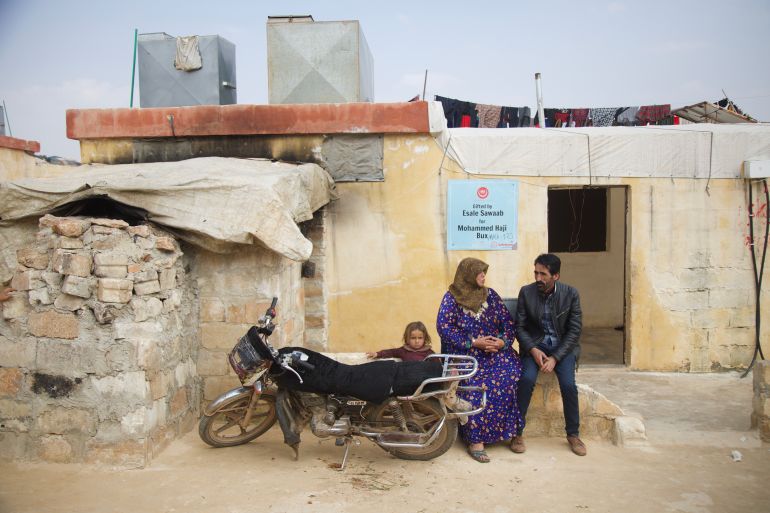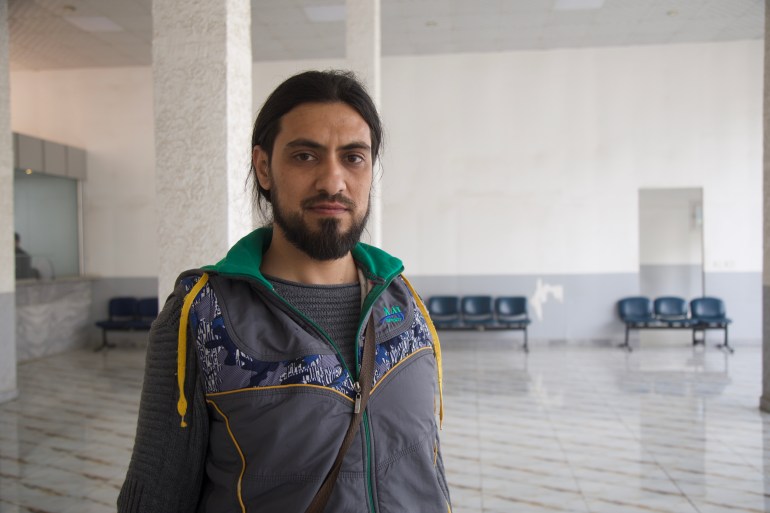After earthquakes, Syrians utilise new rules to cross from Turkey
Thousands of Syrians have decided to rely on support networks in their home country after earthquakes devastated their homes in Turkey.

Bab al-Hawa, Syria – After seven years apart, Hussein al-Ahmed made the journey from Turkey, and finally reunited with his family in northern Syria.
But it was not any change related to the war in Syria that brought him back.
Keep reading
list of 3 itemsTurkey and Syria: Two nations in pain after earthquake
Photos: Turkey-Syria earthquake, one month on
Instead, al-Ahmed is one of the thousands of Syrian refugees in Turkey who have taken advantage of a relaxation in regulations following the devastating earthquakes that hit southeastern Turkey and northern Syria a month ago.
Turkish authorities now allow Syrian refugees residing in earthquake-hit provinces to voluntarily return to opposition-controlled northwestern Syria and then come back – as long as they do not spend longer than six months away.
For Syrians living in the 10 Turkish provinces most deeply affected by the earthquakes, where so many buildings have been destroyed and many remain unsafe, Syria – a country they fled due to the now 12-year war – suddenly looks more appealing, albeit temporarily.
“After my sister and I spent 10 days in public parks, I did not have any choice other than return to Syria through the voluntary return system that was announced,” said al-Ahmed, a 30-year-old refugee originally from northern rural Hama who lives in the city of Iskenderun in southern Turkey.

The desperate condition of the southern Turkish provinces hit by the earthquakes, and the lack of relatives in other provinces, are among the pull factors that have encouraged some Syrians to make the journey to northern Syria. There, they have relatives and may be able to at least secure a shelter before again considering whether to stay or to return to Turkey, once earthquake-hit areas have been rebuilt.
The number of Syrian refugees who arrived in Syria via the Bab al-Hawa, Bab al-Salam, and Jarablus border crossings has reached almost 40,000.
“The number of refugees arriving through the Bab al-Hawa crossing is nearly 15,000,” Mazen Alloush, director of media relations on the Syrian side of the crossing between the country and Turkey, told Al Jazeera.
Alloush said that the return programme extends only to holders of the temporary protection permit, and is not open to holders of tourist residency permits, or even dual Syrian-Turkish citizens.
A Turkish defence ministry official also told Reuters last week that 40,000 Syrians had returned to their home country.
Since April last year, Syrians had been prevented from making round trips back to Syria, and were not allowed to return to Turkey if they crossed the border.
The issue of Syrian refugees in Turkey, who number more than 3.75 million, has been a controversial one in recent years, with rising anti-Syrian sentiment among the Turkish public.
Opportunity to get away
For al-Ahmed, his planned three-month trip to Syria provides an opportunity to get away from what he experienced during the earthquakes, which killed more than 50,000 people in both Turkey and Syria, but he will then need to return.
“I will go back to Turkey after my trip ends because my family lives in a refugee camp here and I do not want to increase their burden,” al-Ahmed said. “I also have to resume work so I can secure a living for me and my family here.”
For others, the opportunity to return home allowed them to finally say goodbye to family members that had passed in their absence.
Malak Khazna, a Syrian refugee who has lived in the Turkish city of Antakya for the past nine years, lost her mother two years ago, but had been unable to return for fear of being stuck in Syria.
“My number one reason for returning is visiting my mother’s grave. Perhaps she would forgive me for when I couldn’t say goodbye and take care of her during her illness,’ Khazna told Al Jazeera.

Khazna said that the destruction caused by the earthquake had reminded her of her experiences during the war in Syria, where buildings were toppled and civilians were stuck under the rubble.
“My stay is for three months. I will live with my son and his family,” said Khazna. “If I find things to be stable, and there are no air strikes, I will remain here and won’t return to Turkey. I went to Turkey to flee the [Syrian President Bashar] al-Assad regime’s air strikes – I didn’t go there to settle.”
The quake-stricken, southern Turkish provinces host the highest numbers of Syrian refugees in Turkey, in light of their proximity to the Syrian borders, and their low rent and cost of living in comparison to the other provinces.
Some of the refugees who resided in these provinces have now decided to make a permanent return after the earthquake, in which many lost their jobs and their belongings.
Hassan Hasram, a father to eight children, is a Syrian refugee who lived in Antakya.
Now, after losing his grandson and son-in-law in the earthquake, he has decided to go back to Syria.
“I can’t move to another province because of rent skyrocketing after the earthquake in most Turkish provinces. Also, my family is big and I won’t be able to afford our expenses after losing my workplace,” said Hasram.
Hasram told Al Jazeera that he has no relatives besides his sister, who lives in a refugee camp near the Syrian-Turkish border, and her tent would not be enough to shelter him and his family.
And so, between the option of the tent he currently lives in, and making the risky journey back to Syria, he has decided to go home.
“Things are very bad in the camp [in Turkey]. There is a serious shortage of aid, whether in terms of food, or heating, or even drinking water,” Hasram said. “Turkey is now part of the past, and I won’t be able to go back again.”